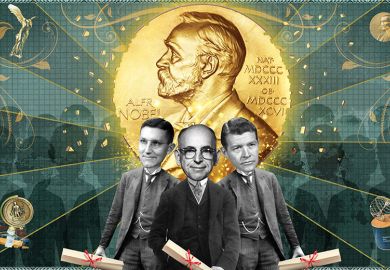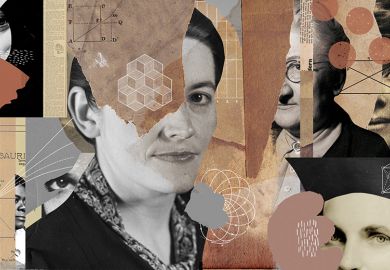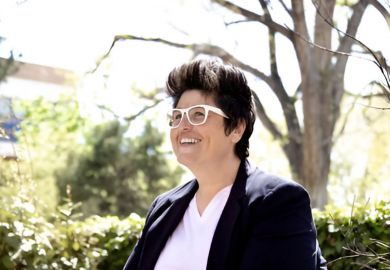The scientific discoveries celebrated by this year’s Nobel prizes were as impressive as ever, spanning the creation of lithium-ion batteries, the first discoveries of planets beyond our solar system, and the revelation of how cells sense and adapt to oxygen availability.
However, they have also emphasised long-running perceived flaws with the awards – and, in particular, have led to renewed calls for the prize committees to consider dispensing their science awards to teams rather than individuals and to use them to elevate less well-known figures in academia.
Jason Wright, professor of astronomy and astrophysics at Penn State University, said that while the Nobels were “wonderful public outreach tools”, they “inevitably celebrate the people instead of the discovery”.
“Many of the discoveries awarded Nobels are from those who saw farther because they ‘stood on the shoulders of giants’,” he said on Twitter, questioning whether other scientists who had made important advances on exoplanets – the subject of this year’s physics prize – but had been more cautious in their claims might have won the award had they been “more cavalier”.
Speaking to Times Higher Education, Professor Wright said that he would “prefer to see the prize focus more on the discovery rather than the discoverers”, and one way to do that would be to include “group awards”.
A maximum of three people can share a Noble prize, under the current rules, although the peace prize has previously been handed out to organisations.
Although Professor Wright recognised that there was some value in “having someone who’s the face of a discovery”, one drawback was that “you tend to create heroes instead of focusing on a discovery that might have happened anyway without them”, he said.
“We look at who wins the prize, and it’s overwhelmingly white men. And if the purpose of putting a face on a discovery is just to tell a story, the story that you end up telling is that it’s generally white men who are doing important science,” he said.
“The story should instead be about all the people who do science and [about] how science really happens. And that’s a big drawback to the Nobel committee’s approach.”
This year’s physics, chemistry and medicine awards were each handed out to three men, only one of whom was not white: Akira Yoshino, a Japanese chemist.
Professor Wright added that he welcomed the fact that the literature prize has often been awarded to someone who he, “not being in the field of literature, had never heard of”.
“It’s a way to elevate that person and their work to a broad audience that might not otherwise know about them,” he said. “The physics prize doesn’t always do that. It tries to pick the obvious person, the person who has already been celebrated and won prizes for the work that they’ve done.
“The Nobel prize could elevate voices instead of just amplifying the stature that people have already earned.”
Sophia Nasr, a cosmology PhD student at the University of California, Irvine, agreed that the Nobel prize does not recognise the large teams of people who have contributed to a discovery and said that group awards would also help to “mitigate the issue” of gender and diversity bias.
“We can’t ignore the fact that there has been throughout the years persistent gender discrimination in the prizes awarded,” she said.
“It is literally snubbing so much work by so many people, and putting that one face to the award [means] that no one remembers or thinks about the fact that these are huge team efforts.”
However, Ms Nasr said, it was unlikely that the Nobel prize would make this change because team awards would be considered to have less “prestige”.
She cited Vera Rubin, a US astronomer who pioneered work on galaxy rotation rates, as one woman who had been snubbed by the awards, noting that her discovery was “akin” to the breakthrough finding that the expansion of the universe is accelerating, which won the physics prize in 2011.
“There is no reason why she did not get the Nobel prize, except for one thing, and that is that she’s a woman,” Ms Nasr said.
“The prizes that were awarded this year were so exciting, [yet] I just can’t get excited about it any more, knowing what the committee has persistently done and will probably continue to do.”
ellie.bothwell@timeshighereducation.com
Science heroes: 2019 Nobel prizewinners
Chemistry
John Goodenough, Virginia H. Cockrell centennial chair of engineering, University of Texas at Austin; Stanley Whittingham, distinguished professor of chemistry and materials science and engineering, Binghamton University, State University of New York; Akira Yoshino, professor, Meijo University, “for the development of lithium-ion batteries”.
Physics
James Peebles, Albert Einstein professor of science at Princeton University, “for theoretical discoveries in physical cosmology”.
Michel Mayor, honorary professor, University of Geneva; Didier Queloz, professor of physics, University of Cambridge, “for the discovery of an exoplanet orbiting a solar-type star”.
Physiology or medicine
William Kaelin, professor of medicine, Harvard University; Sir Peter Ratcliffe, director of clinical research, Francis Crick Institute; Gregg Semenza, professor of genetic medicine, Johns Hopkins University, “for their discoveries of how cells sense and adapt to oxygen availability”.
POSTSCRIPT:
Print headline: Award Nobels to teams, not solo ‘heroes’, say scientists
Register to continue
Why register?
- Registration is free and only takes a moment
- Once registered, you can read 3 articles a month
- Sign up for our newsletter
Subscribe
Or subscribe for unlimited access to:
- Unlimited access to news, views, insights & reviews
- Digital editions
- Digital access to THE’s university and college rankings analysis
Already registered or a current subscriber?








